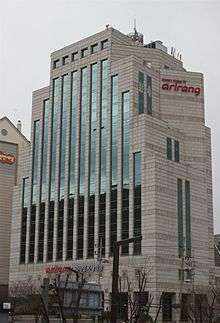Arirang TV
Arirang TV (Korean: 아리랑 TV; RR: Arirang tibeui) is an English-language South Korean television network based in Seoul and aimed at an overseas audience. It is operated by the Korea International Broadcasting Foundation and is financially supported by the Ministry of Culture, Sports and Tourism.[1] The channel, which airs in 105 countries, is considered a public relations arm of the South Korean government.[2][3]
| Arirang TV | |
|---|---|
 | |
| Launched | 3 February 1997 |
| Owned by | Korea International Broadcasting Foundation |
| Picture format | 1080i HDTV (downscaled to 16:9 480i/576i for the SDTV feeds) |
| Slogan |
|
| Country | South Korea |
| Language | English |
| Broadcast area | Worldwide |
| Headquarters | Seoul, South Korea |
| Website | Official website |
Availability | |
| Satellite | |
| AsiaSat7 (Asia, Oceania) | 3755Mhz V |
| Astra 1L (Europe) | 11509Mhz V |
| Astra 2G (UK) | 11224Mhz V |
| Badr-4 (UAE and surrounding) | 12111Mhz H |
| Hotbird 13B (Europe) | 11623Mhz V |
| Intelsat 19 (Asia, Oceania, Pacific) | 3815Mhz V, 12729MHz H |
| Intelsat 20 (Asia, Africa, Europe, Oceania) | 4053.5Mhz V, 3795Mhz V |
| Intelsat 21 (Americas) | 3880Mhz V |
| CANAL+ (Myanmar) | Channel 184 |
| Cable | |
| DirectvSee Arirang website | Channel 2095 |
| IPTV | |
| Freebox (France) | Channel 516 |
| Rostelecom (Russia) | Channel 708 |
| Slovak Telekom (Slovakia) | Channel 178 |
| CHT MOD (Taiwan) | Channel 751 |
| Du (UAE) | Channel 920 |
| Sky (United Kingdom) | Channel 522 |
| StarHub TV (Singapore) | Channel 817 |
| Streaming media | |
| YouTube (Arirang TV) | Live broadcast |
| YouTube (Arirang World) | Live broadcast |
| YouTube (Arirang UN) | Live broadcast |

The channel airs different programming in different countries, but generally airs news, cultural programs, educational shows and documentaries.[4][5]
History
Arirang International Broadcasting Corporation began airing on February 3, 1997. It was operated by the non-profit Korea International Broadcasting Foundation, which was created by Article 32 of the South Korean Civil Code on April 10, 1996. Initially, the channel was available only on cable and satellite television in South Korea and was targeted to foreigners living in or visiting the country.[6]
Arirang International Broadcasting Corporation has three channels for overseas viewers. Arirang World was established as a satellite television channel in 1999 and is broadcast in English, Chinese, Spanish, Korean, Arabic, Russian, Vietnamese, and Indonesian. Arirang UN was established in 2015, and is broadcast in English.[6][5] As of 2018, the channels are broadcast in 105 countries.[1]
Coverage

Arirang International Broadcasting Corporation provides subtitle services in a variety of different languages in order to interact closely with overseas viewers.
(English, Chinese, Spanish, Arabic, Russian, Vietnamese, Indonesian)
See also
References
- Jung, Min-ho (2018-01-04). "Arirang TV to sack 190 employees, shut 18 programs". The Korea Times. Retrieved 2018-03-25.
- Kim, Tong-hyung (2009-05-20). "Arirang TV Fighting Do-or-Die Fight". The Korea Times. Retrieved 2018-03-25.
- Kim, Daeho (2018). Media Governance in Korea 1980–2017. Springer. p. 87. ISBN 3319703021.
- Kim, Jae-heun (2016-09-27). "Arirang TV starts 24-hour broadcast in UK". The Korea Times. Retrieved 2018-03-25.
- "About Arirang: Channel Profile". Arirang. Korea International Broadcasting Foundation. Retrieved 2018-03-25.
- Kim, Junghoon (2009). "The Current State & Issues in International Broadcasting in the Republic of Korea: Case Study on Arirang International Broadcasting Corporation". Japan Media Communication Center. Retrieved 2018-03-27.
- Satellite listings: "How to Watch: Satellite". Arirang. Korea International Broadcasting Foundation. Retrieved 2018-03-27.
- IPTV listings: Provider websites and "How to Watch: Platform". Arirang. Korea International Broadcasting Foundation. Retrieved 2018-03-27.